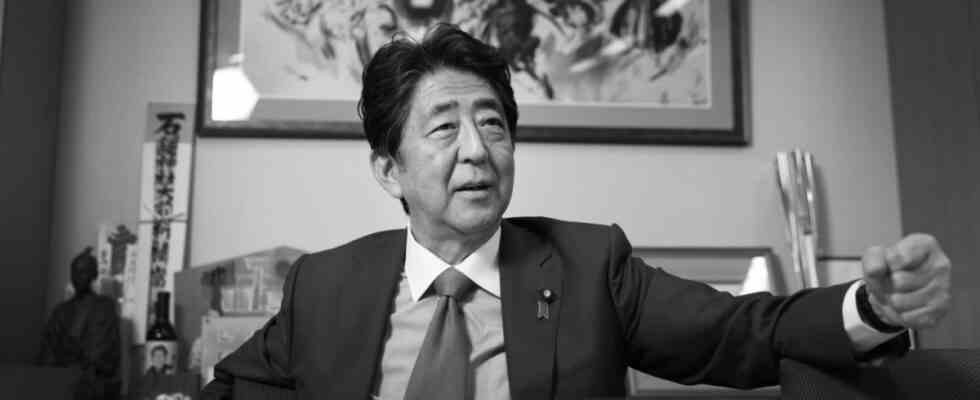Shinzo Abe wasn’t tired. In any case, he doesn’t look tired in the pictures of his last speech. He came to the small stage surrounded by colorful flags at the Yamato-Saidaiji train station in the city of Nara because he wanted to support a fellow party member from the right-wing conservative governing LDP party ahead of Sunday’s upper house election. So he still had the energy to go out into the street and yell at people’s disinterest with his fists clenched. And he didn’t feel too bad about it either, although as a record prime minister and proven LDP rescuer, he could have left the tedious daily political business behind him long ago.
Shinzo Abe was certainly not what one would call a modern politician in Europe’s liberal circles. His career didn’t start with the better argument, but with the more established pedigree. Coming from a conservative family, son of Foreign Minister Shintaro Abe and grandson of Prime Minister Nobusuke Kishi, his career in the Japanese power structure was predetermined. Where he came from, the culture of debate, social diversity and environmental policy did not play a major role. His themes were economics and Japanese pride.
But he was a passionate advocate of his agenda. Nobody who hangs up. A fighter. And with this quality he has come a long way.
Shinzo Abe was one of the most influential Japanese politicians of the post-war period. From 2012 to 2020 he was prime minister, longer in a row than anyone before him. He had also been prime minister from 2006 to 2007, but his importance mainly has to do with his second term. Abe led the LDP out of its biggest crisis at the time: as a result of various scandals and the global economic crisis, it lost its majority in parliament for the first time in 2009 to a competitor, the centrist DPJ. Abe brought her back to power as chairman.
His goals: implement “Abenomics”, make the country defensive
He managed to do this with a clear nationalist course and a policy that tended not to deal with social issues. His so-called Abenomics strategy combined loose monetary policy with consistent economic promotion and brought the island state gentle growth during the years of the global economic boom.
Under Abe, Japan seemed more confident and cosmopolitan. However, it is also less self-critical when it comes to the history of the island state as an aggressor in World War II. And Abe was mostly interested in other countries when he wanted something from them. For example, he kept in close contact with Russian President Vladimir Putin because he hoped to get back the so-called Northern Territories, the southern islands of the Kuril Islands off Hokkaido, which Russia has occupied since World War II.
In the summer of 2020, Shinzo Abe resigned, officially because of the chronic intestinal inflammation that forced him to retire in 2007. He looked back on his work at the time – and regretted most of all that he hadn’t managed to change Article 9 of the constitution, which has prescribed strict pacifism for the country since the end of the Second World War, in the sense of a more defensive Japan.
There were various corruption scandals during his tenure. Abe always survived as the supposedly ignorant alpha politician. But of course that didn’t make him any more popular. Abe polarized. Until the end. For he had by no means withdrawn. In the LDP he was still influential as the leader of the largest internal party group.
When his hapless successor Yoshihide Suga resigned in 2021, he made a significant contribution to his former foreign minister, the rather tame Fumio Kishida, becoming head of the LDP and thus also prime minister – and not the agile, unpredictable Taro Kono.
Lately, however, there has been a lot of talk about Kishida’s strength. Abe’s proximity to Russia is outdated. After Putin’s attack on Ukraine, Japan supports the sanctions of the western world and, more than ever, takes responsibility against its own interests. Kishida is now on the way to doing what Abe always wanted to do: reform the pacifist constitution and be allowed to protect Japan with its own missiles.
It may be that Shinzo Abe was secretly annoyed. Maybe he had a plan to regain his importance. In any case, he was not yet tired and, at 67, still relatively young when he was shot dead in the Nara on Friday.

